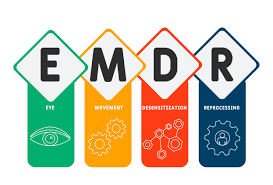
How EMDR Can Help with Little “t” and Big “T” Trauma
Trauma is different for everyone, but it can have a big impact on how we feel, connect with others, and go about our daily lives. When people think about trauma, they often imagine huge, life-altering events—things like natural disasters, abuse, or war. But there’s another kind of trauma that’s quieter yet still powerful. Therapists often call them “little t” trauma and “big T” trauma. Eye Movement Desensitization and Reprocessing (EMDR) is a powerful tool and proven to be super effective therapy method for dealing with both kinds and I use it to help individuals overcome the grip of trauma.
By guiding clients through structured sessions that engage both memory and bilateral stimulation, EMDR allows the brain to reprocess distressing experiences in a safe and supportive environment. This transformative approach not only reduces the emotional weight of past events but also fosters resilience and healing, unlocking a pathway to a brighter, more empowered future.
So, let’s dive into what these types of trauma are and how EMDR can make a difference.
What’s the Difference Between “Little t” and “Big T” Trauma?
Before we get into how EMDR works, it’s good to understand what “little t” and “big T” trauma mean. Both can leave a mark on someone’s life, but they’re different in how they show up.
“Big T” Trauma
“Big T” trauma happens when someone goes through a major, scary event that threatens their safety or wellbeing. These are the moments that leave people shaken to their core. Examples include:
- Surviving a car crash
- Being physically or sexually assaulted
- Witnessing or experiencing combat in the military
- Going through a natural disaster like a hurricane or earthquake
- Difficult birth
People who go through these events might develop PTSD (Post-Traumatic Stress Disorder), which can show up as flashbacks, feeling constantly on edge, or shutting down emotionally. The good news? EMDR is a powerful tool that can help people work through these intense experiences.
“Little t” Trauma
On the flip side, “little t” trauma is made up of smaller, everyday events that might not seem like a big deal to others but still hurt deeply. These experiences can add up over time and include things like:
- Growing up with constant criticism or feeling neglected
- Being bullied at school or work
- Dealing with a tough breakup or divorce
- Feeling like a failure or not good enough
These might not lead to PTSD, but they can still cause anxiety, sadness, and a shaky sense of self. Since “little t” trauma often comes from relationships, it can really affect how people see themselves and interact with others.
Why Is EMDR So Useful for Both
Kinds of Trauma?
What’s great about EMDR is that it works whether your trauma is a huge, life-changing event or a series of smaller hurts. Here’s how it helps:
For “Big T” Trauma
Dealing with “big T” trauma can feel overwhelming, so EMDR takes things step by step. For instance, someone who survived a terrifying car accident might start by tackling smaller pieces of what happened. Over time, EMDR helps them feel safe and in control again.
For those who’ve lived through something like a natural disaster, the memories might come back in flashes, making it hard to move forward. EMDR helps tone down the emotional intensity, letting them process what happened without reliving it constantly.
For “Little t” Trauma
Even though “little t” trauma might not seem as big, it can stick with you in sneaky ways. For example, growing up with constant criticism might leave someone believing they’re not good enough. EMDR helps reframe those old beliefs into something kinder and more confident.
Or, a person who faced bullying might feel stuck in patterns of mistrust or self-doubt. EMDR can help break those patterns, making way for healthier relationships and self-esteem.
Wrapping It Up
EMDR is a game-changer for tackling trauma, whether it’s the big, life-altering kind or the quieter, everyday struggles that still leave a mark. By helping people reprocess tough memories, EMDR makes it possible to move forward with renewed strength and confidence. If you or someone you know is wrestling with the effects of trauma, EMDR might just be the tool to help turn the page and start a new chapter of healing.










